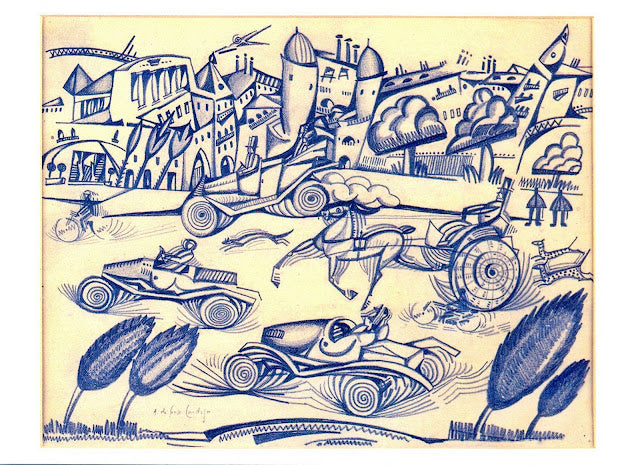Description
The work "Motion" (1912) of Amadeo de Souza-Cardoso is a vibrant expression of artistic concerns and fantasies that characterize the European avant-garde of the twentieth century. Born in Portugal in 1887, Souza-Cardoso was a pioneer of modernism in his country and his work reflects influences of Cubism and Fauvism, which are distilled in the visual power of this painting. "Motion" is a work that invites a deep reflection on the conception of movement and energy that underlies the very nature of painting.
In the center of the composition, a dynamic and bold use of color is evidenced, with saturated tones that are intertwined in an almost symphonic game. Souza-Cardoso seems to seek not only to represent reality, but translate it, revealing a world where speed and movement are almost palpable. The forms in this work are fragmented and angular, with contours that suggest a vertiginous movement, transforming visual experience into a torrent of sensations. That relationship between figure and fund is decisive in how the action is perceived, giving the impression that each element of the painting is in a constant state of transformation.
The characters, although they are not the main focus of the work, are intertwined with abstract elements in a visual choreography. The human figure, which could be interpreted as a dancer or a moving being, reflects the influence of African art and the aesthetics of dance that so much fascinated the artists of their time. The line between the figure and the space is blurred, creating a sense of visual immediacy that evokes an almost primary type of energy. This representation of the human figure in interaction with its environment suggests an aspiration to the total, in which each fragment contributes to the whole, revealing an inherent harmony in the chaos of the movement.
A fascinating aspect of "motion" is his focus on modernity, a recurring theme in the work of Souza-Cardoso, who sought to capture the essence of an era marked by industrialization and rapid social changes. The work is registered within a broader vision that questions the traditional notions of perception and time. Here, paint is not only a means of representation, but a vehicle to explore contemporary experience, where the ephemeral moment and the motionless are in a constant dialogue.
In terms of style, "motion" is a clear example of the expressionist use of color and shape. Fauvism, with its exaltation of color and emotion, can be perceived in the vibrant choice of the palette that Souza-Cardoso uses. Like fauvistas, he is not afraid to use color as a means of emotional expression, a tool to transmit sensations rather than realities. In addition, the influence of Cubism is manifested in the fragmentation of forms, inviting the viewer to explore multiple angles and perspectives within a single image.
In short, "motion" of Amadeo de Souza-Cardoso is not only a representation of the movement, but also a poetic response to an era that is felt at full speed. In its composition, color and theme, the work becomes a reflection of the tensions and aspirations of European modernism, showing an artist who not only observes his world, but interprets it in ways that resonate to this day. In it, modernity manifests not only as a context, but as a deep experience that challenges our perceptions and invites us to participate in the dance of time and space that surrounds us.
KUADROS ©, a famous paint on your wall.
Hand-made oil painting reproductions, with the quality of professional artists and the distinctive seal of KUADROS ©.
Art reproduction service with satisfaction guarantee. If you are not completely satisfied with the replica of your painting, we refund your money 100%.

